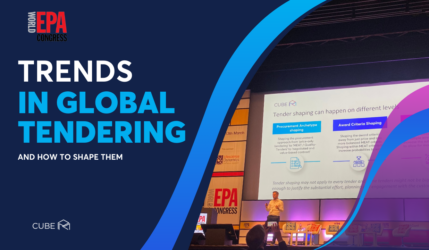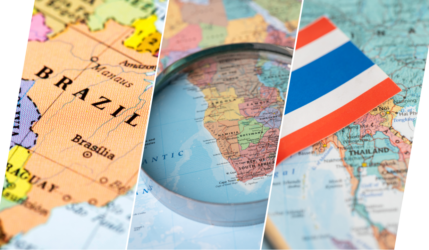Announcing our partnership with Pharma CIMICON, the leading Competitive & Market Intelligence Event for Pharma & Biotech in Europe. We will be in Berlin from November 26-28, 2023, exploring the transformative power of AI in the tendering landscape.
In the interview below, our Chief Commercial Officer, Nico Bacharidis, discusses the details of implementing effective tendering and pricing strategies for pharmaceutical products. Gain valuable insights into understanding the tendering landscape, navigating competition, and uncovering the vast market potential for pharmaceutical products. Additionally, discover the pivotal role of AI technologies in enhancing agility for Life Sciences companies, providing a glimpse into the future of innovation in the industry.
we.CONECT: The pop in your job: What is the most exciting thing about your job, and what do you believe are the most critical skills needed to succeed in your field?
Nico Bacharidis:
I love working at the intersection of Health-care and AI. I believe this is the most exciting place to be at the moment. To use latest technology in order create know-how and insights, which was simply not possible some years ago, is very exciting.
we.CONECT: Can you share your experience in developing and implementing effective tendering /pricing strategies for pharmaceutical products? How is technology helping to navigate pricing & tendering challenges and optimize outcomes?
Nico Bacharidis:
Around 10 years ago I had the opportunity to build up and then lead the global tendering organization at Pfizer. It was pioneering work as we were one of the first companies building such capabilities on a global scale and experimenting with earlier forms of AI to collect and manage data. Nowadays, the technological opportunities are immense to improve many parts of the tendering and pricing process. NLP can be used to daily screen and find tender opportunities around the world. Algorithms are used to simulate thousands of scenarios to define optimal price ranges and price-points. Generative AI can be used to create and describe value propositions or generate executive summaries. The benefits are very clear and tangible in terms of efficiency gains as well as revenue increase and profitability improvements
we.CONECT: Understanding the tendering landscape, competition and market potential for pharmaceutical products is a constant challenge for market access professionals. Can you please share your thoughts on how to overcome these challenges?
Nico Bacharidis:
The challenge with tendering data is that it is scattered across hundreds of websites and hidden in thousands of documents on millions of pages. Every country and often every health region or hospital works separately and differently. The complexity is immense. New opportunities are posted every day and often companies have very little time to prepare the bid and to response. Data is not standardized and chaotic and often also not complete. To try and manage this manually and without technology is hopeless or at the very least not at all efficient and effective.
Today’s possibilities of AI / NLP allow a daily automated screening of tender publications and tender awards as well as helping to standardize, structure and visualize the data in a meaningful way. Smart technology can also support in automatically prioritizing opportunities in order to allocate resources most effectively. The data can also be used to frequently estimate and update the market size, better understand customers and their buying behavior, have more clarity on competitor strategies or pricing trends across markets just to give a few examples.
we.CONECT: The pharmaceutical tendering landscape is subject to continuous change and evolving pricing dynamics. How can latest technology keep market access people informed and up to date on industry trends?
Nico Bacharidis:
Latest technology allows what we call an ‘ongoing market research’. Instead of doing a traditional market research every year or so or interviewing some ‘experts’, technology can update and structure data on a monthly, weekly or if needed even daily basis. An ongoing market research can for example detect if a competitor is bidding more aggressively and winning more tenders and market share. Or it can signal changes in how deals and tenders are awarded. In some countries for examples we see trends towards more ESG criteria (Environmental & Social criteria). Being up-to-date on these trends can inform and improve your go-to-market strategy or your differentiation tactics.
we.CONECT: Healthcare providers often operate within diverse regional & national procurement environments / frameworks. Can AI technologies improve agility for Pharma & MedTech companies, to meet the unique requirements and challenges presented by different markets and healthcare provider settings?
Nico Bacharidis:
We indeed see big differences across many tender markets. In some countries you have few, but very big tenders. In other countries you have thousands, but smaller tenders. This requires a different Sales setup and approach and different resources and capabilities. We also see differences in how tenders are awarded. Some countries are price-driven, other more quality-driven. Here again it needs a different way of product differentiation and marketing. Technology and AI can help to understand these differences and nuances across markets or even customers, as well as in terms of differentiation and communication using more advanced generative AI forms.










 21/03/2024
21/03/2024 

